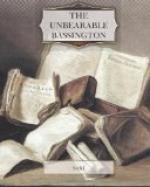A basket underneath a tree
A yellow tiger is to me,
If it is nothing more.
The more really alarming episodes of the road, the hoot and whir of a passing motor-car or the loud vibrating hum of a wayside threshing-machine, were treated with indifference.
On turning a corner out of a narrow coppice-bordered lane into a wider road that sloped steadily upward in a long stretch of hill Elaine saw, coming toward her at no great distance, a string of yellow-painted vans, drawn for the most part by skewbald or speckled horses. A certain rakish air about these oncoming road-craft proclaimed them as belonging to a travelling wild-beast show, decked out in the rich primitive colouring that one’s taste in childhood would have insisted on before it had been schooled in the artistic value of dulness. It was an unlooked-for and distinctly unwelcome encounter. The mare had already commenced a sixfold scrutiny with nostrils, eyes and daintily-pricked ears; one ear made hurried little backward movements to hear what Elaine was saying about the eminent niceness and respectability of the approaching caravan, but even Elaine felt that she would be unable satisfactorily to explain the elephants and camels that would certainly form part of the procession. To turn back would seem rather craven, and the mare might take fright at the manoeuvre and try to bolt; a gate standing ajar at the entrance to a farmyard lane provided a convenient way out of the difficulty.
As Elaine pushed her way through she became aware of a man standing just inside the lane, who made a movement forward to open the gate for her.
“Thank you. I’m just getting out of the way of a wild-beast show,” she explained; “my mare is tolerant of motors and traction-engines, but I expect camels—hullo,” she broke off, recognising the man as an old acquaintance, “I heard you had taken rooms in a farmhouse somewhere. Fancy meeting you in this way.”
In the not very distant days of her little-girlhood, Tom Keriway had been a man to be looked upon with a certain awe and envy; indeed the glamour of his roving career would have fired the imagination, and wistful desire to do likewise, of many young Englishmen. It seemed to be the grown-up realisation of the games played in dark rooms in winter fire-lit evenings, and the dreams dreamed over favourite books of adventure. Making Vienna his headquarters, almost his home, he had rambled where he listed through the lands of the Near and Middle East as leisurely and thoroughly as tamer souls might explore Paris. He had wandered through Hungarian horse-fairs, hunted shy crafty beasts on lonely Balkan hillsides, dropped himself pebble-wise into the stagnant human pool of some Bulgarian monastery, threaded his way through the strange racial mosaic of Salonika, listened with amused politeness to the shallow ultra-modern opinions of a voluble editor or lawyer in some wayside Russian town, or learned




